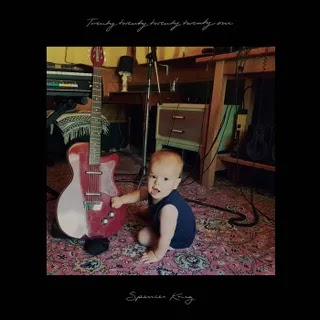The anxieties of isolation and newfound fatherhood are reflected in home recordings the Wolf Parade co-founder made in his rural home studio during the doldrums of 2020 and 2021.
Spencer Krug has seldom stood still for long. A founding member of indie rockers Wolf Parade, he has skipped between numerous projects over the past two decades, from Swan Lake—the Canadian supergroup featuring Destroyer’s Dan Bejar and former Frog Eyes bandmate Carey Mercer—to Sunset Rubdown and Moonface, which grew from solo outings into collaborative endeavors. On Twenty Twenty Twenty Twenty One, his second solo LP under his own name, he ruminates on stasis and change: “First came the death of old ways/Then came the birth of the new,” he sings, just past the record’s halfway point. Recorded between 2020 and 2021 in the seclusion of home studio on rural Vancouver Island, Twenty Twenty Twenty Twenty One offers an introspective and idiosyncratic look at life during downtime.
Like its self-released 2021 predecessor, Fading Graffiti, Twenty Twenty Twenty Twenty One is the fruit of Krug’s Patreon output, culled from the collection of songs that he’s released to subscribers every month since 2019. Influenced by both his newfound fatherhood and the stopped clocks of the pandemic, the album channels the claustrophobia and complexities of the last two years. “The days are getting shorter/The nights are without number,” he intones atop melancholy guitar and synths on “Overcast Afternoon.” There’s an overarching air of heaviness throughout: Days are filled with nonstop rain, feelings of vulnerability (“Do you really know how much I need you”), and doomscrolling past articles about “the start of post-humanism” and “the end of time.”
Krug’s wryly imagistic lyrics often feel like pages torn from a diary. He logs his everyday existentialism in conversational couplets (“I sometimes wonder if I haven’t/In some ways already died/Then I think/Of course I have, and so has any person/Who just burns to stay alive”) and finds poetry in dully quotidian words like “podcasters.” He mulls building “a moat around the house” and populating it with sharks, as though isolation was turning out to be preferable to the alternative. Repetition frequently intensifies the songs’ pent-up energy, though Krug rarely allows his songs to form proper choruses. The closest he gets is the occasional repeated refrain (“My muscles are fine, it’s in my fucking bones”). But in the album’s final moments, patterns are ruptured. “You can hurt me for free/Circa 2020,” he intones three times before delivering his wry send-off: “But come 2021/you’ll have to carve me away.”
Where Fading Graffiti was energized by instinctual indie-rock melodies and embellished with slide guitar, Twenty Twenty Twenty Twenty One leans into relatively unadorned production, augmenting strummed acoustic guitar with broad strokes of synthesizer and the occasional programmed rhythm. The seven-minute opus “Cut the Eyeholes Out So I Can See” weaves acoustic and electronic instrumentation together, echoing the lyrics’ contrast between realism and surrealism; on “Bone Grey” he swaps out his voice for a robotic narrator, while the comparatively jovial “Chisel Chisel Stone Stone” floats atop a buoyant krautrock groove.
The sparser arrangements, where Krug is accompanied solely by an acoustic guitar or piano, are plenty vibrant on their own. His voice trembles against thundering piano in “Hanging Off the Edge” and leaps to its upper register in “My Muscles Are Fine,” lifted by insistent guitar chords. In the opening “Slipping In and Out of the Pool,” he strips the song back from a fuller-sounding live-stream performance in 2021, reducing it to the essentials: strummed acoustic, a hint of synth, and that trademark warble of his. The comparison is a reminder of just how elastic his songwriting can be. “I think the world is a rubber band,” he sings; “I think we’re slipping in and out of the pool/I think an hourglass is different than quicksand/I think it’s cool.” It’s a classically Krug stanza—and a reminder that even the doldrums of isolation are fertile soil for a mind as active as his.



0 comments:
Post a Comment